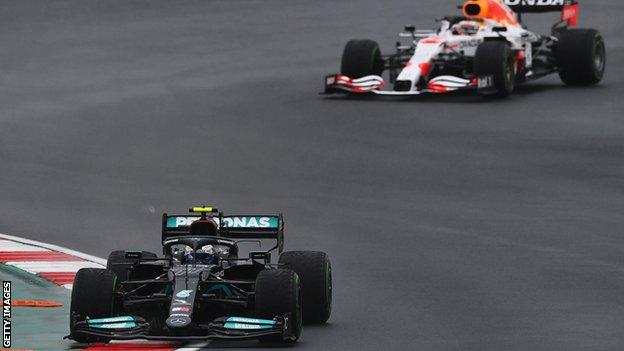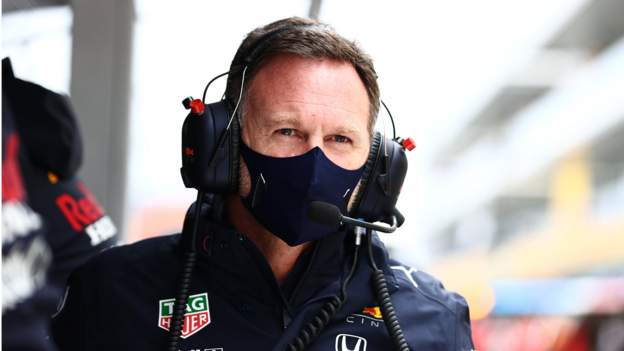
Red Bull team principal Christian Horner has expressed his “surprise” at gains he says Mercedes have made with their engine performance.
Under Formula 1’s rules, the title rivals are not allowed to improve the power of their engines in-season.
Horner said Mercedes’ straight-line speed “has taken a significant step recently”.
“It’s surprising they appear to have made the step they have with the power-unit,” he added.
Mercedes reject Red Bull’s claims, saying nothing has changed in their engine apart from fitting a new one to Hamilton’s car for last weekend’s Turkish Grand Prix.
Both Hamilton and title rival Max Verstappen of Red Bull have taken new engines – at the cost of grid penalties – over the last two races, Verstappen at the previous race in Russia, Hamilton in Turkey.
Verstappen leads Hamilton by six points with six races to go after the Dutchman finished second in Sunday’s Turkish Grand Prix and Hamilton in fifth.
Internal combustion engines always degrade over time, so Hamilton’s new engine will have provided a small performance advantage over the one he was using previously.
Red Bull’s claims echo similar ones Hamilton himself made about his rival’s Honda engine earlier in the season.
Red Bull made an apparent step forward in performance around the time of the French Grand Prix in early summer, and Hamilton publicly questioned how they had been able to do that.
Red Bull’s explanation at the time was that aerodynamic upgrades to their car had allowed them to run smaller rear wings, reducing drag and boosting straight-line speed, without harming cornering performance.
Horner said: “We could match them with smaller [rear] wings previously; now we can’t get near. And we saw that particularly at this circuit, where Lewis had a straight-line advantage with a bigger rear wing on the car.”
Horner added that reliability problems with the Mercedes engine could also be affecting impressions of performance.
“You can see across all their teams Mercedes obviously have some reliability issues they are managing, which is unusual for Mercedes,” Horner said. “But their performance is still incredibly impressive.
“Whether one comes at the expense of the other, I don’t know, but if you look at some of the speed deltas on the back straight at some points it was 15-20km/h, which is more than if there had been DRS (overtaking aid in use).”
Mercedes say they are puzzled by Horner’s suggestions, saying they are not borne out in the data.
Mercedes F1 boss Toto Wolff admitted the company were managing reliability against performance with their engines.
“When you start to push the boundaries with power-unit performance, at a certain stage you will experience some obstacles,” he said.
“Our power-units have been the most reliable since the introduction of the hybrid engines in 2014 and and because the boundaries are being pushed we have seen examples of, let’s say, unusual noises within the combustion engine that aren’t completely understood at that stage yet.
“They caused some troubles in the past; we had some engines that basically failed and now it’s about containing the problem because changing parts is not something you would tackle.”
Mercedes appear to have made a step forward in overall performance compared to Red Bull since F1 reconvened following its summer break.
Over the first half of the season, Red Bull had an average advantage in qualifying of 0.026%.
In the three dry qualifying sessions in the second half of the season so far, Mercedes have had an advantage of 0.286%.
However, the three tracks in question – Monza, Sochi and Istanbul Park – are regarded as favouring Mercedes, whereas two of the remaining six races – Mexico and Brazil – are expected to significantly advantage Red Bull.


